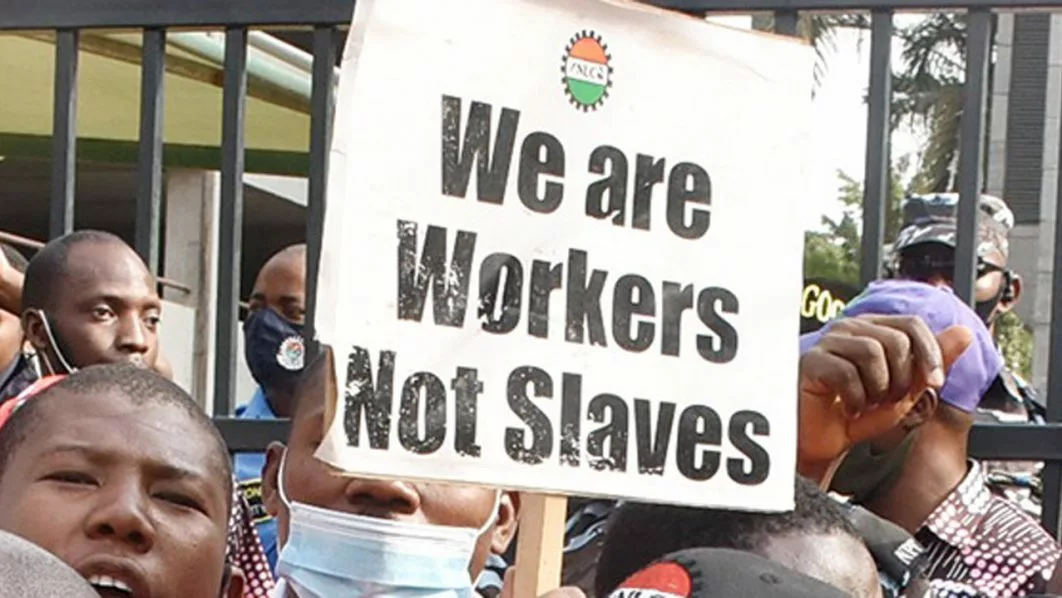As part of the federal government’s effort to assuage the economic pains that have resulted from the removal of fuel subsidies in May 2023, the long-mooted increase in the minimum wage has left stakeholders befuddled as to whether there will indeed be an increase, and how much will that increase be.
With a largely daily fall in the value of the naira, an inflation rate of 28.92 per cent compared to a year ago, labour unions are clamouring for a N200,000 minimum wage. But such a sudden increase in wages of federal and state government workers would open the floodgates of inflation as has never been seen in Nigeria.
With a civil service size of approximately 1.7 million, a conservative addition of even N30,000 would be tantamount to infusing more than N50 billion into the economy every month. Without value addition in terms of productivity, the government will resort to printing, which would in turn cause massive demand-pull inflation. Even without the private sector taking a cue from the civil service that would engender an economy-threatening inflation, which would, by extension, make Nigerians poorer over time.
Because Nigeria imports more than 50 percent of goods consumed, and the relentless sliding value of the naira, a lecturer at Auchi Polytechnic, Zakari Mohamed, has remarked that in tandem with increasing the minimum wage, the government should come up with policies to stem the tide of an eroding naira, which is a major contributing factor of inflation. If not, according to him, the current marauding inflation will soon wipe out the value of any added minimum wage.
The president of the Independent Shareholders Association of Nigeria (ISAN), Moses Igbrude, sheds a similar opinion. He said for a new minimum wage to have any impact on the livelihoods of Nigerians, inflation must be brought under control.
But Livinus Azosiwe, the chief executive of CashLinks, cautioned that increasing the minimum wage is a distraction from the initial intention of subsidy removal in the first place. He noted that the removal of subsidies was intended to bridge the country’s infrastructure gap as well as health and education.
He stated that such investments are not prominent in the 2024 fiscal budget, and the budget is not robust enough to accommodate such humungous allocation to recurrent expenditure. He stressed that it would be a disaster for the government to continue borrowing to meet its recurrent expenditure after the removal of subsidies.
Although the economic situation in Nigeria has graduated to a matter of necessity that the federal and state governments adjust the country’s national minimum wage, it is noteworthy that in the quest for a new minimum wage in Nigeria, the path to success lies in a harmonious blend of inclusivity, transparency, and collaboration. A rancour-free implementation requires a meticulous approach that takes into account the diverse perspectives of stakeholders, addressing concerns with a balanced and measured strategy.
A former dean at Babcock University, and lecturer at Adeleke University, Professor Tayo Bello, noted that foremost, the initiation of inclusive stakeholder consultations emerges as a beacon of wisdom. He said bringing representatives from government, employers, employees, and civil society to the negotiating table ensures a comprehensive understanding of the economic landscape. He also stated that this collective approach not only considers various viewpoints but also instills a sense of ownership among stakeholders, fostering unity rather than dissent.
Bello stressed that transparent economic assessments stand as pillars of trust in this process. “Clear communication regarding the economic data and methodologies used to determine the new minimum wage is vital. This transparency not only educates stakeholders but also guards against misinformation, dispelling potential sources of discord before they can take root,” he said.
Also speaking, a financial economist at Nnamdi Azikiwe University, Dr. Felix Echekoba, said to ease the transition, a phased implementation approach would be a pragmatic choice considering concerns around inflation. He stated that rather than imposing an immediate change, this strategy allows businesses and the economy to adapt gradually. “By doing so, the risk of job losses or business closures is mitigated, providing a smoother journey towards the new wage structure.
“Establishing social dialogue platforms serves as a testament to the commitment to ongoing communication. Regular discussions become the lifeblood of collaboration, offering a space for stakeholders to voice concerns and negotiate in real time. This dynamic approach prevents the accumulation of grievances, ensuring a continuous and evolving understanding among all parties involved,” he said.
On his part, an economist and retired lecturer, Dr.Moses Olaleye, averred that acknowledging and addressing regional disparities proves crucial for a nationally-accepted minimum wage. He said by tailoring the wage structure to account for varying economic conditions in different regions, the implementation becomes not just a national policy but a reflection of justice and equity, garnering support from all corners of the country.
“Simultaneously, investing in skills development programmes represents a forward-thinking strategy. Elevating the skills and productivity of the workforce not only justifies higher wages but also aligns with long-term economic goals. This focus on empowerment contributes to a positive narrative surrounding the wage increase, fostering a sense of shared progress,” he said.
Barrister David Charles, who on the legal aspect of a new minimum wage, noted that the establishment of robust legal safeguards and enforcement mechanisms is the bedrock of a system that values compliance and fairness as most state governments tend to falter on the issue of minimum wage implementation. Such measures not only protect the rights of employees but also guarantee the actualisation of the new minimum wage. He stressed that legal clarity acts as a shield against disputes, fortifying the foundation of a smooth implementation.
NATIONAL ECONOMY notes that public awareness campaigns serve as bridges between policy and public understanding. Informing the citizens about the rationale behind the new minimum wage and its potential benefits cultivates public support. By dispelling misconceptions and fostering a shared vision of economic progress, these campaigns become integral in maintaining a positive social atmosphere.
The achievement of a rancour-free new minimum wage in Nigeria demands a delicate choreography of strategic elements. Through inclusivity, transparency, and collaboration, Nigeria can navigate this transformative process with resilience, ensuring not only economic growth but also a united front towards a shared and prosperous future.





